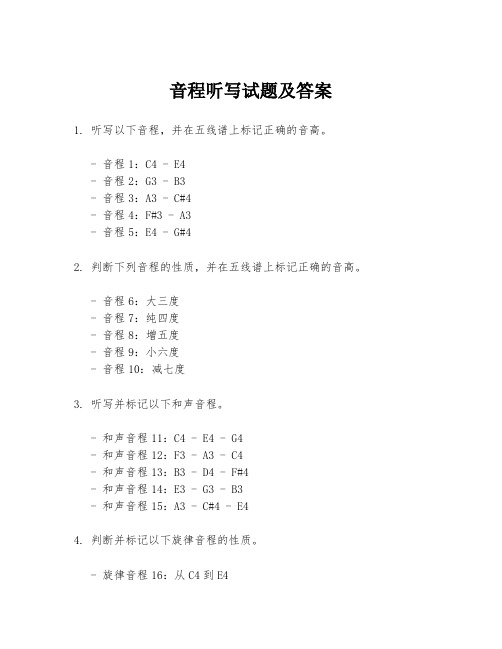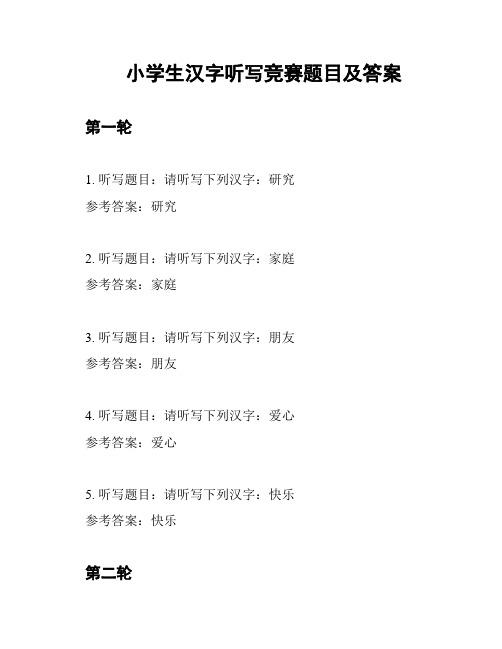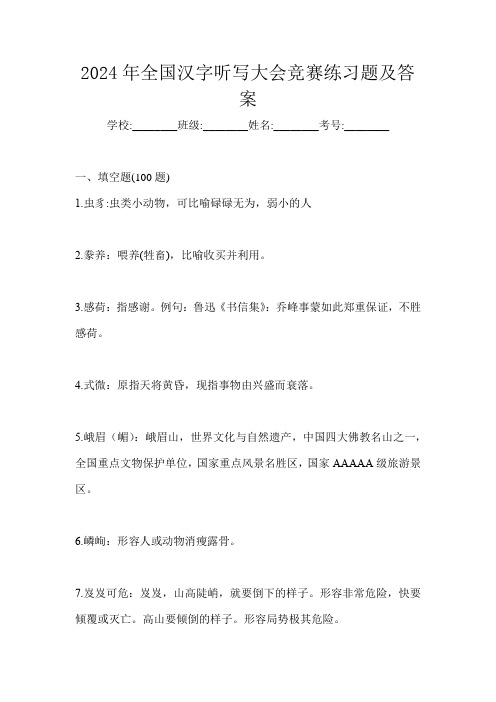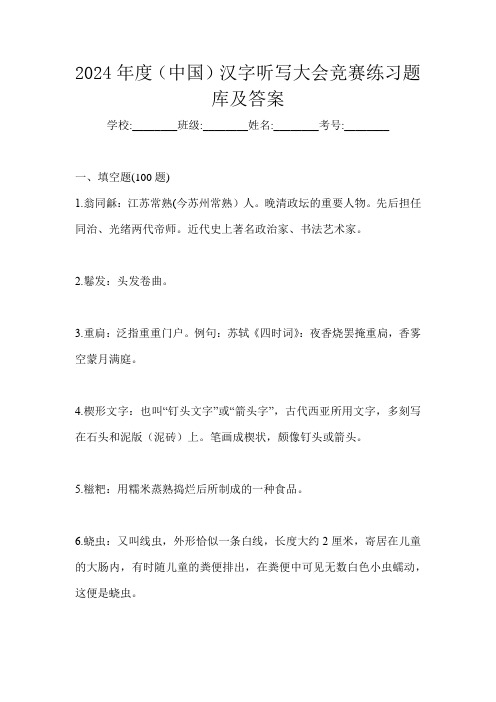听写练习答案
小学汉字听写试题及答案

小学汉字听写试题及答案一、听写下列汉字。
1. 请听写“阳光”的“阳”字。
答案:阳2. 请听写“月亮”的“月”字。
答案:月3. 请听写“花朵”的“花”字。
答案:花4. 请听写“树木”的“树”字。
答案:树5. 请听写“河流”的“河”字。
答案:河6. 请听写“山川”的“山”字。
答案:山7. 请听写“海洋”的“洋”字。
答案:洋8. 请听写“天空”的“空”字。
答案:空9. 请听写“大地”的“地”字。
答案:地10. 请听写“星星”的“星”字。
答案:星二、根据拼音写汉字。
1. 请根据拼音“chūn”写出对应的汉字。
答案:春2. 请根据拼音“xià”写出对应的汉字。
答案:夏3. 请根据拼音“qiū”写出对应的汉字。
答案:秋4. 请根据拼音“dōng”写出对应的汉字。
答案:冬5. 请根据拼音“mù”写出对应的汉字。
答案:木6. 请根据拼音“shuǐ”写出对应的汉字。
答案:水7. 请根据拼音“huǒ”写出对应的汉字。
答案:火8. 请根据拼音“shān”写出对应的汉字。
答案:山9. 请根据拼音“tián”写出对应的汉字。
答案:田10. 请根据拼音“yǔ”写出对应的汉字。
答案:雨三、根据词语写汉字。
1. 请写出“晴朗”的“朗”字。
答案:朗2. 请写出“美丽”的“丽”字。
答案:丽3. 请写出“温暖”的“暖”字。
答案:暖4. 请写出“寒冷”的“寒”字。
答案:寒5. 请写出“快乐”的“乐”字。
答案:乐6. 请写出“悲伤”的“悲”字。
答案:悲7. 请写出“高兴”的“兴”字。
答案:兴8. 请写出“忧愁”的“忧”字。
答案:忧9. 请写出“幸福”的“幸”字。
答案:幸10. 请写出“健康”的“康”字。
答案:康四、根据句子写汉字。
1. 请写出“春天的花真美丽”中的“真”字。
答案:真2. 请写出“夏天的太阳很温暖”中的“温”字。
答案:温3. 请写出“秋天的果实很丰富”中的“果”字。
答案:果4. 请写出“冬天的雪很洁白”中的“洁”字。
中文单词听写考试题及答案

中文单词听写考试题及答案一、听写填空题(每空1分,共20分)1. 春天到了,花园里的花朵竞相开放,形成了一片________(灿烂)的花海。
2. 他________(勤奋)好学,每天都是图书馆里最后一个离开的人。
3. 她的歌声________(悦耳),让人听了心情愉悦。
4. 这件________(工艺品)制作精美,展现了匠人的高超技艺。
5. 他的演讲充满了________(激情),赢得了听众的阵阵掌声。
6. 孩子们在________(操场)上追逐嬉戏,充满了欢声笑语。
7. 这部电影的情节________(曲折),让人猜不到结局。
8. 他对待工作的态度非常________(认真),每一个细节都不放过。
9. 这个________(问题)的解决需要我们大家共同的努力。
10. 她穿着一件________(优雅)的长裙,显得格外引人注目。
二、听写选择题(每题2分,共20分)11. 请选出“和谐”的正确写法:________。
A. 和协B. 合协C. 和谐D. 谐和12. “繁荣”一词的正确书写是:________。
A. 繁荣B. 荣发C. 荣华D. 繁荣华13. “探索”的书写正确的是:________。
A. 探求B. 探讨C. 探索D. 探查14. “卓越”的正确写法是:________。
A. 卓绝B. 卓越C. 卓著D. 卓异15. “宁静”的书写正确的是:________。
A. 宁净B. 宁靖C. 安静D. 宁静16. “辉煌”的正确写法是:________。
A. 辉皇B. 辉煌C. 辉映D. 辉光17. “勤奋”的正确书写是:________。
A. 勤勉B. 勤奋C. 勤快D. 勤劳18. “和谐”的书写正确的是:________。
A. 合谐B. 和谐C. 和协D. 谐和19. “创新”的正确写法是:________。
A. 创心B. 创新C. 创立D. 创造20. “卓越”的正确写法是:________。
音程听写试题及答案

音程听写试题及答案1. 听写以下音程,并在五线谱上标记正确的音高。
- 音程1:C4 - E4- 音程2:G3 - B3- 音程3:A3 - C#4- 音程4:F#3 - A3- 音程5:E4 - G#42. 判断下列音程的性质,并在五线谱上标记正确的音高。
- 音程6:大三度- 音程7:纯四度- 音程8:增五度- 音程9:小六度- 音程10:减七度3. 听写并标记以下和声音程。
- 和声音程11:C4 - E4 - G4- 和声音程12:F3 - A3 - C4- 和声音程13:B3 - D4 - F#4- 和声音程14:E3 - G3 - B3- 和声音程15:A3 - C#4 - E44. 判断并标记以下旋律音程的性质。
- 旋律音程16:从C4到E4- 旋律音程17:从G3到B3 - 旋律音程18:从A3到C#4 - 旋律音程19:从F#3到A3 - 旋律音程20:从E4到G#4答案:1. 音程1:C4 - E4(大三度)音程2:G3 - B3(纯四度)音程3:A3 - C#4(大三度)音程4:F#3 - A3(大三度)音程5:E4 - G#4(增四度)2. 音程6:大三度(C4 - E4)音程7:纯四度(C4 - F4)音程8:增五度(C4 - G#4)音程9:小六度(C4 - A4)音程10:减七度(C4 - Bb4)3. 和声音程11:C4 - E4 - G4和声音程12:F3 - A3 - C4和声音程13:B3 - D4 - F#4和声音程14:E3 - G3 - B3和声音程15:A3 - C#4 - E44. 旋律音程16:大三度旋律音程17:纯四度旋律音程18:大三度旋律音程19:大三度旋律音程20:增四度。
汉字听写全国大赛题目及其答案

汉字听写全国大赛题目及其答案第一题听写以下汉字:百雀羚答案:bǎi què líng第二题听写以下汉字:麦克风答案:mài kè fēng第三题听写以下汉字:电视机答案:diàn shì jī第四题听写以下汉字:苹果答案:píng guǒ第五题听写以下汉字:大象答案:dà xiàng第六题听写以下汉字:火车站答案:huǒ chē zhàn第七题听写以下汉字:电脑答案:diàn nǎo第八题听写以下汉字:钢琴答案:gāng qín第九题听写以下汉字:书包答案:shū bāo第十题听写以下汉字:手机答案:shǒu jī第十一题听写以下汉字:电影答案:diàn yǐng第十二题听写以下汉字:手表答案:shǒu biǎo第十三题听写以下汉字:饭店答案:fàn diàn第十四题听写以下汉字:自行车答案:zì xíng chē第十五题听写以下汉字:雨伞答案:yǔ sǎn第十六题听写以下汉字:眼镜答案:yǎn jìng第十七题听写以下汉字:太阳答案:tài yáng第十八题听写以下汉字:电梯答案:diàn tī第十九题听写以下汉字:猫咪答案:māo mī第二十题听写以下汉字:自动门答案:zì dòng mén。
小学生汉字听写竞赛全套题目及正确答案

小学生汉字听写竞赛全套题目及正确答案一年级1. 听写题:写出下列汉字的正确读音。
- 一(yī)- 二 (èr)- 三(sān)- 四 (sì)- 五(wǔ)2. 听写题:写出下列汉字的正确读音。
- 大 (dà)- 小(xiǎo)- 高(gāo)- 矮(ǎi)- 瘦 (shòu)二年级1. 听写题:根据听到的读音写出下列汉字。
- 书(shū)- 画 (huà)- 课 (kè)- 字 (zì)- 笔(bǐ)2. 听写题:根据听到的读音写出下列汉字。
- 飞(fēi)- 跑(pǎo)- 游 (yóu)- 跳 (tiào)- 游泳(yóuyǒng)三年级1. 听写题:根据听到的句子写出所缺的汉字。
- 我喜欢吃冰淇淋。
冰淇淋。
- 妈妈给我买了一本漫画书。
书。
- 昨天爸爸带我去游泳。
游泳。
- 小狗跑得很快。
跑得很快。
- 我喜欢画画。
画画。
2. 听写题:根据听到的句子写出所缺的汉字。
- 昨天我们去公园玩了一天。
公园玩了一天。
- 我们在山上看到了很多花。
山上看到了很多花。
- 小鸟在树上唱歌。
树上唱歌。
- 爸爸给我买了一只球。
球。
- 妈妈给我买了一条裙子。
裙子。
四年级1. 听写题:根据听到的句子选择正确的词语填空。
- 我们每天都要读/写日记。
读/写日记。
- 这个字很难,我不会写/读。
写/读。
- 妈妈给我买了一本有趣的课/书。
课/书。
- 妹妹正在研究画/游泳。
画/游泳。
- 我们在课堂上研究课/字。
课/字。
2. 听写题:根据听到的句子选择正确的词语填空。
- 今天是星期日/星期一。
星期日/星期一。
- 我们在公园/学校里玩得很开心。
公园/学校里玩得很开心。
- 爸爸带我去游泳/跑步。
游泳/跑步。
- 妈妈给我买了一只漂亮的裙子/球。
裙子/球。
- 我们在山上看到了很多花/书。
花/书。
五年级1. 听写题:根据听到的句子选择正确的词语填空。
小学生汉字听写大赛完整题库与答案

小学生汉字听写大赛完整题库与答案第一部分:基础汉字
1. 请听写下列汉字:人
答案:人
2. 请听写下列汉字:山
答案:山
3. 请听写下列汉字:水
答案:水
4. 请听写下列汉字:火
答案:火
5. 请听写下列汉字:木
答案:木
6. 请听写下列汉字:口
答案:口
7. 请听写下列汉字:日答案:日
8. 请听写下列汉字:月答案:月
9. 请听写下列汉字:风答案:风
10. 请听写下列汉字:雨答案:雨
第二部分:常用汉字
11. 请听写下列汉字:家答案:家
12. 请听写下列汉字:学
答案:学
13. 请听写下列汉字:爱答案:爱
14. 请听写下列汉字:书答案:书
15. 请听写下列汉字:游答案:游
16. 请听写下列汉字:乐答案:乐
17. 请听写下列汉字:运答案:运
18. 请听写下列汉字:动答案:动
19. 请听写下列汉字:画答案:画
20. 请听写下列汉字:鱼答案:鱼
第三部分:复杂汉字
21. 请听写下列汉字:蓝答案:蓝
22. 请听写下列汉字:黄答案:黄
23. 请听写下列汉字:紫答案:紫
24. 请听写下列汉字:青答案:青
25. 请听写下列汉字:红
答案:红
26. 请听写下列汉字:黑
答案:黑
27. 请听写下列汉字:白
答案:白
28. 请听写下列汉字:葡
答案:葡
29. 请听写下列汉字:萄
答案:萄
30. 请听写下列汉字:甜
答案:甜
这是一份小学生汉字听写大赛的完整题库与答案。
请根据听到的汉字写出对应的汉字,并核对答案。
三年级上册听写试题及答案

三年级上册听写试题及答案一、听写词语1. 请听写下列词语:- 春天- 风筝- 草地- 快乐- 朋友2. 请听写以下成语:- 春暖花开- 风和日丽- 绿草如茵- 欢声笑语- 亲如兄弟二、听写句子1. 请听写以下句子,并注意标点:- 春天到了,万物复苏。
- 我们在草地上放风筝,非常快乐。
- 太阳温暖地照耀着大地,花儿也开了。
2. 请听写以下句子,并注意标点:- 我们几个好朋友一起去公园玩。
- 公园里的花五颜六色,真好看。
- 我们互相帮助,亲如兄弟。
三、听写段落1. 请听写以下段落:春天是一年四季中最美的季节。
当春天来临,大地回春,万物复苏。
小朋友们穿上新衣,到户外去放风筝,享受春天的温暖和快乐。
2. 请听写以下段落:在春天的公园里,我们可以看到各种各样的花。
它们有的红,有的黄,有的蓝,有的紫,五彩缤纷,美丽极了。
小朋友们在花丛中追逐嬉戏,欢声笑语,充满了整个公园。
答案一、听写词语1. 春天、风筝、草地、快乐、朋友2. 春暖花开、风和日丽、绿草如茵、欢声笑语、亲如兄弟二、听写句子1. 春天到了,万物复苏。
我们在草地上放风筝,非常快乐。
太阳温暖地照耀着大地,花儿也开了。
2. 我们几个好朋友一起去公园玩。
公园里的花五颜六色,真好看。
我们互相帮助,亲如兄弟。
三、听写段落1. 春天是一年四季中最美的季节。
当春天来临,大地回春,万物复苏。
小朋友们穿上新衣,到户外去放风筝,享受春天的温暖和快乐。
2. 在春天的公园里,我们可以看到各种各样的花。
它们有的红,有的黄,有的蓝,有的紫,五彩缤纷,美丽极了。
小朋友们在花丛中追逐嬉戏,欢声笑语,充满了整个公园。
结束语通过这份听写试题,我们希望能够帮助三年级的学生们更好地掌握课文内容,提高他们的听力和书写能力。
希望每位学生都能够认真完成,取得好成绩。
小学生汉字听写竞赛题目及答案

小学生汉字听写竞赛题目及答案第一轮
1. 听写题目:请听写下列汉字:研究
参考答案:研究
2. 听写题目:请听写下列汉字:家庭
参考答案:家庭
3. 听写题目:请听写下列汉字:朋友
参考答案:朋友
4. 听写题目:请听写下列汉字:爱心
参考答案:爱心
5. 听写题目:请听写下列汉字:快乐
参考答案:快乐
第二轮
1. 听写题目:请听写下列汉字:书包参考答案:书包
2. 听写题目:请听写下列汉字:树木参考答案:树木
3. 听写题目:请听写下列汉字:好吃参考答案:好吃
4. 听写题目:请听写下列汉字:阳光参考答案:阳光
5. 听写题目:请听写下列汉字:世界参考答案:世界
第三轮
1. 听写题目:请听写下列汉字:学校参考答案:学校
2. 听写题目:请听写下列汉字:教室
参考答案:教室
3. 听写题目:请听写下列汉字:篮球
参考答案:篮球
4. 听写题目:请听写下列汉字:电视
参考答案:电视
5. 听写题目:请听写下列汉字:电脑
参考答案:电脑
以上为小学生汉字听写竞赛题目及答案。
希望对大家有所帮助!。
2024年度(中学)汉字听写大会竞赛练习题及答案

2024年度(中学)汉字听写大会竞赛练习题及答案学校:________班级:________姓名:________考号:________一、填空题(100题)1.擢升:提升,提拔。
2.飨宴:摆酒席请客。
3.眼眵:眼睑分泌出的黄色液体。
俗称眼屎。
有的地区叫眵目糊。
4.恓惶::惊慌烦恼。
穷苦。
例句:李白《上安州李长史书》:白孤剑谁托,悲歌自怜,迫于恓惶,席不暇暖。
5.嘲啁:戏谑,调笑。
6.偏袒:谝护一方7.雉堞:古代城墙的内侧叫宇墻或是女墙,而外侧则叫垛墙或雉堞。
8.朝齑暮盐:形容生活贫苦。
例句:韩愈《送穷文》:太学四年,朝齑暮盐,惟我保汝,人皆汝嫌。
9.不祧之祖:旧时比喻创立某种事业受到尊崇的人。
例句:清·吴乔《答万季野诗问》:至于空同,唯以高声大气为少陵;于鳞,唯以皮毛鲜润为盛唐……然在今日,遂为不祧之祖,何也?10.蟠螭:是龙属的蛇状神怪之物,是一种没有角的早期龙。
11.糌粑:青稞麦炒熟后磨成的面,吃时用酥油茶或青稞酒拌和,捏成小团,是藏族人的主食。
12.告罄:1.宣告完毕。
2.谓财物用尽。
13.波谲云诡:好像云彩和水波那样,形态不可捉摸。
原形容房屋构造就像云彩、波浪一样千姿百态。
后多形容事物变幻莫测。
14.癃闭::中医指小便量少,甚至不通的病。
例句:清·纪昀《阅微草堂笔记》:侍姬之母沉媪,言盐山有刘某者,患癃闭,百药不验。
15.哂纳:客套话。
用于请人收下礼物。
例句:吴晗《给士兵以人的待遇》:新兵有规定之行粮,三餐则克扣两餐,医药茶水费用则全部哂纳。
16.摧颓:蹉跎,失意。
17.考妣:古代称已死的父母。
父死后称“考”母死后称“妣”。
18.网罟:捕鱼及捕鸟兽的工具。
借指法网。
例句:杜甫《五盘》:地僻无网罟,水清反多鱼。
19.噤若寒蝉:冬天的蝉一声不响。
20.阿谀:是指说别人爱听的话,迎合奉承。
迎合别人的意思,说好听的话,含贬义。
21.邋遢:一般指不整洁,不利落。
22.涸辙之鲋::比喻处在困境中急待救援的人。
小学汉字听写大赛练习题及答案

小学汉字听写大赛练习题及答案一、汉字听写练习题
请根据听到的汉字,正确书写下列词语。
1. 听写词语:[ ] 聪明 [ ]
答案:聪明
2. 听写词语:[ ] 快乐 [ ]
答案:快乐
3. 听写词语:[ ] 学校 [ ]
答案:学校
4. 听写词语:[ ] 朋友 [ ]
答案:朋友
5. 听写词语:[ ] 学习 [ ]
答案:学习
二、汉字听写练习题
请根据听到的汉字,正确书写下列词语。
1. 听写词语:[ ] 美丽 [ ]
答案:美丽
2. 听写词语:[ ] 勇敢 [ ]
答案:勇敢
3. 听写词语:[ ] 热爱 [ ]
答案:热爱
4. 听写词语:[ ] 梦想 [ ]
答案:梦想
5. 听写词语:[ ] 奋斗 [ ]
答案:奋斗
三、汉字听写练习题
请根据听到的汉字,正确书写下列词语。
1. 听写词语:[ ] 家人 [ ]
答案:家人
2. 听写词语:[ ] 风景 [ ]
答案:风景
3. 听写词语:[ ] 爱心 [ ]
答案:爱心
4. 听写词语:[ ] 进步 [ ]
答案:进步
5. 听写词语:[ ] 努力 [ ]
答案:努力
希望这份练习题及答案能够帮助孩子们提高汉字听写能力,培养对汉字的兴趣。
祝大家在汉字听写大赛中取得好成绩!。
现代汉字听写大赛试题及答案

现代汉字听写大赛试题及答案一、选择题1. 下列汉字中,哪个字是左右结构?A. 森B. 晶C. 众D. 品答案:D2. 下列汉字中,哪个字是上下结构?A. 炎B. 昌C. 曲D. 纸答案:A3. 下列汉字中,哪个字是全包围结构?A. 国B. 团C. 医D. 回答案:D4. 下列汉字中,哪个字是半包围结构?A. 达B. 边C. 广D. 府答案:A5. 下列词语中,哪个词是由两个独体字组成的?A. 体B. 休C. 字D. 毛答案:B二、填空题1. 汉字中的“六书”指的是________、________、________、________、________、________。
答案:象形、指事、会意、形声、转注、假借2. 下列汉字中,属于指事字的是________、________、________。
答案:上、下、刃3. 下列汉字中,属于会意字的是________、________、________。
答案:森、昌、曲4. 下列汉字中,属于形声字的是________、________、________。
答案:国、医、回5. 下列汉字中,属于转注字的是________、________、________。
答案:达、边、广三、改错题1. 下列词语中,哪个词的汉字书写有误?请改正。
A. 精兵简政(正确)B. 风驰电掣(正确)C. 调查研究(正确)D. 暴饮暴食(暴→饱)答案:D四、听写题1. 请听写以下词语:A. 精兵简政B. 风驰电掣C. 调查研究D. 暴饮暴食答案:同改错题答案五、阅读理解题阅读以下文章,回答问题。
《愚公移山》太行、王屋二山,方七百里,高万仞,本在冀州之南,河阳之北。
北山愚公者,年且九十,面山而居。
惩山北之塞,出入之迂也,聚室而谋,欲移山。
诸君量之,其利害如何?皆曰:“君之言韪矣!以残年余力,曾不能毁山之一毛,其如土石何?”遂相与,从扶老曳屣,寒暑易节,始一反焉。
河曲智叟笑而止之,曰:“甚矣,汝之不惠。
初二听写大赛试题及答案

初二听写大赛试题及答案一、听写词语(每词1分,共20分)1. 朝气蓬勃2. 风华正茂3. 意气风发4. 金榜题名5. 学富五车6. 才高八斗7. 博古通今8. 满腹经纶9. 博学多才10. 才华横溢11. 学贯中西12. 学无止境13. 孜孜不倦14. 精益求精15. 锲而不舍16. 持之以恒17. 一丝不苟18. 专心致志19. 聚精会神20. 心无旁骛答案:1. 朝气蓬勃2. 风华正茂3. 意气风发4. 金榜题名5. 学富五车6. 才高八斗7. 博古通今8. 满腹经纶9. 博学多才10. 才华横溢11. 学贯中西12. 学无止境13. 孜孜不倦14. 精益求精15. 锲而不舍16. 持之以恒17. 一丝不苟18. 专心致志19. 聚精会神20. 心无旁骛二、成语听写(每题2分,共20分)1. 画龙点睛2. 画蛇添足3. 画饼充饥4. 画地为牢5. 画虎不成反类犬6. 画中藏诗7. 画龙画虎难画骨8. 画饼不能充饥9. 画虎画皮难画骨10. 画龙点睛,画蛇添足答案:1. 画龙点睛2. 画蛇添足3. 画饼充饥4. 画地为牢5. 画虎不成反类犬6. 画中藏诗7. 画龙画虎难画骨8. 画饼不能充饥9. 画虎画皮难画骨10. 画龙点睛,画蛇添足三、诗句听写(每句2分,共20分)1. 春眠不觉晓,处处闻啼鸟。
2. 红豆生南国,春来发几枝。
3. 独在异乡为异客,每逢佳节倍思亲。
4. 举头望明月,低头思故乡。
5. 床前明月光,疑是地上霜。
6. 举杯邀明月,对影成三人。
7. 月落乌啼霜满天,江枫渔火对愁眠。
8. 春江潮水连海平,海上明月共潮生。
9. 月出惊山鸟,时鸣春涧中。
10. 月有阴晴圆缺,人有悲欢离合。
答案:1. 春眠不觉晓,处处闻啼鸟。
2. 红豆生南国,春来发几枝。
3. 独在异乡为异客,每逢佳节倍思亲。
4. 举头望明月,低头思故乡。
5. 床前明月光,疑是地上霜。
6. 举杯邀明月,对影成三人。
7. 月落乌啼霜满天,江枫渔火对愁眠。
全国汉字听写竞赛的题目及答案

全国汉字听写竞赛的题目及答案第一题题目:请听写下面的汉字:天答案:天第二题题目:请听写下面的汉字:人答案:人第三题题目:请听写下面的汉字:山答案:山第四题题目:请听写下面的汉字:水答案:水第五题题目:请听写下面的汉字:火答案:火第六题题目:请听写下面的汉字:木答案:木第七题题目:请听写下面的汉字:金答案:金第八题题目:请听写下面的汉字:土答案:土第九题题目:请听写下面的汉字:风答案:风第十题题目:请听写下面的汉字:雨答案:雨第十一题题目:请听写下面的汉字:花答案:花第十二题题目:请听写下面的汉字:草答案:草第十三题题目:请听写下面的汉字:鸟答案:鸟第十四题题目:请听写下面的汉字:石答案:石第十五题题目:请听写下面的汉字:月答案:月第十六题题目:请听写下面的汉字:阳答案:阳第十七题题目:请听写下面的汉字:阴答案:阴第十八题题目:请听写下面的汉字:云答案:云第十九题题目:请听写下面的汉字:星答案:星第二十题题目:请听写下面的汉字:地答案:地第二十一题题目:请听写下面的汉字:家答案:家第二十二题题目:请听写下面的汉字:国答案:国第二十三题题目:请听写下面的汉字:中答案:中第二十四题题目:请听写下面的汉字:学答案:学第二十五题题目:请听写下面的汉字:生答案:生第二十六题题目:请听写下面的汉字:死答案:死第二十七题题目:请听写下面的汉字:爱答案:爱第二十八题题目:请听写下面的汉字:恨答案:恨第二十九题题目:请听写下面的汉字:快答案:快第三十题题目:请听写下面的汉字:慢答案:慢第三十一题题目:请听写下面的汉字:好答案:好第三十二题题目:请听写下面的汉字:坏答案:坏第三十三题题目:请听写下面的汉字:大答案:大第三十四题题目:请听写下面的汉字:小答案:小第三十五题题目:请听写下面的汉字:多答案:多第三十六题题目:请听写下面的汉字:少答案:少第三十七题题目:请听写下面的汉字:长答案:长第三十八题题目:请听写下面的汉字:短答案:短第三十九题题目:请听写下面的汉字:忙答案:忙第四十题题目:请听写下面的汉字:闲答案:闲。
2024年全国汉字听写大会竞赛练习题及答案

2024年全国汉字听写大会竞赛练习题及答案学校:________班级:________姓名:________考号:________一、填空题(100题)1.虫豸:虫类小动物,可比喻碌碌无为,弱小的人2.豢养:喂养(牲畜),比喻收买并利用。
3.感荷:指感谢。
例句:鲁迅《书信集》:乔峰事蒙如此郑重保证,不胜感荷。
4.式微:原指天将黄昏,现指事物由兴盛而衰落。
5.峨眉(嵋):峨眉山,世界文化与自然遗产,中国四大佛教名山之一,全国重点文物保护单位,国家重点风景名胜区,国家AAAAA级旅游景区。
6.嶙峋:形容人或动物消瘦露骨。
7.岌岌可危:岌岌,山高陡峭,就要倒下的样子。
形容非常危险,快要倾覆或灭亡。
高山要倾倒的样子。
形容局势极其危险。
8.数奇:命运不好,遇事多不利。
例句:刘禹锡《赠尹果毅》:问我何自苦,可怜真数奇。
9.崤函之固:比喻地势十分险要。
例句:汉·贾谊《过秦论》:秦孝公据崤函之固,拥雍州之地。
10.祓除:是古代一种除凶去垢的原始宗教仪式。
它在后世不论是内涵还是外在形式都发生了很大的变化。
11.挑衅:故意挑起矛盾或争端。
比如武装挑衅。
12.庑殿顶:中华文化圈国家古代建筑的一种屋顶样式。
在中国是各屋顶样式中等级最高的。
明清时只有皇家和孔子殿堂才可以使用。
唐朝时也见于佛寺。
13.窎远:指距离遥远。
例句:叶圣陶《苦菜》:那些窎远而僭越的忧虑,一霎时在我心里风轮似地环转。
14.期期艾艾:形容口吃的人吐辞重复,说话不流利。
15.罹罪:遭受罪罚。
16.抽抽噎噎:形容低声哭泣。
17.凑份子:也称随份子、凑份子。
婚姻礼俗。
18.罔替:不更换;不废除。
例句:《清史稿》:僧格林沁得旨嘉奖,仍以亲王世袭罔替。
19.游弋:巡逻之意。
20.鲥鱼:鱼,体侧扁,背部黑绿色,腹部银白色,眼周围银白色带金光。
鳞下脂肪丰富,肉鲜嫩,是名贵的食用鱼,生活在海洋中,春季进入河流中产卵。
21.遄行:快速行进。
22.砥砺:磨刀石。
汉字听写试题题库及答案

汉字听写试题题库及答案一、选择题1. 下列词语中,书写正确的一项是:A. 一诺千金B. 一诺千斤C. 一诺干金D. 一诺千斤答案:A2. “不翼而飞”中的“翼”指的是:A. 翅膀B. 羽毛C. 飞翔D. 翅膀的羽毛答案:C二、填空题1. 请写出“锲而不舍”的反义词:______。
答案:半途而废2. “______”常用来形容人或事物具有独特的风格或特点。
答案:独树一帜三、改错题1. 请找出下列句子中的错别字并改正:原句:他总是喜欢独出心裁地解决问题。
答案:将“独出心裁”改为“独辟蹊径”2. 请找出下列成语中的错别字并改正:成语:画龙点精答案:将“精”改为“睛”四、连线题1. 请将下列成语与其对应的解释连接起来:A. 画蛇添足 1. 形容事情做得过分,反而不好B. 画龙点睛 2. 比喻在关键的地方加上一笔,使事物更加完美答案:A-2 B-1五、解释题1. 解释“杯弓蛇影”这个成语的意思。
答案:“杯弓蛇影”形容因疑神疑鬼而引起的无端恐惧。
2. 解释“对牛弹琴”这个成语的意思。
答案:“对牛弹琴”比喻对不懂道理的人讲道理,白费力气。
六、应用题1. 请用“一视同仁”造句。
答案:老师对待学生总是一视同仁,不偏爱任何一个。
2. 请用“画龙点睛”造句。
答案:他在演讲的最后用了一个生动的例子,真是画龙点睛。
七、综合题1. 阅读以下句子,找出并改正其中的错别字:句子:他总是喜欢在人群中脱颖而出,显得格外引人注目。
答案:将“脱”改为“突”2. 请根据句子的意思,用“脱颖而出”造句。
答案:在众多选手中,他凭借出色的表现脱颖而出,赢得了比赛的冠军。
小学级别汉字听写比赛试题及参考答案

小学级别汉字听写比赛试题及参考答案
第一部分:试题
一、听写试题
1. 请听拼音,并写出相应的汉字:`nǐ hǎo`。
2. 请听拼音,并写出相应的汉字:`wǒ māma`。
3. 请听拼音,并写出相应的汉字:`xiè xiè`。
4. 请听拼音,并写出相应的汉字:`zǎo shàng hǎo`。
5. 请听拼音,并写出相应的汉字:`xià wǔ hǎo`。
二、听写短文
请听短文,并根据所听内容填写空缺处的汉字。
大家好,我是小明。
今天是星期__,我们要去__玩。
我和爸爸
妈妈一起坐公__去。
我们先去了动物园,看到了很多__。
接着,我
们去了公园,玩得很开__。
最后,我们去了购物__,买了一些东西。
今天是个__的一天!谢谢大家!
第二部分:参考答案
一、听写试题
1. 你好。
2. 我妈妈。
3. 谢谢。
4. 早上好。
5. 下午好。
二、听写短文
请听短文,并根据所听内容填写空缺处的汉字。
大家好,我是小明。
今天是星期一,我们要去公园玩。
我和爸
爸妈妈一起坐公车去。
我们先去了动物园,看到了很多动物。
接着,我们去了公园,玩得很开心。
最后,我们去了购物中心,买了一些
东西。
今天是个美好的一天!谢谢大家!
注:以上为参考答案,具体内容以听写录音为准。
音程听写模拟试题及答案

音程听写模拟试题及答案一、单音程听写1. 听写下列音程:- 纯一度- 大二度- 小三度- 纯四度- 增四度/减五度- 大六度- 小七度- 纯八度2. 请根据听到的音程,选择正确的音程名称:- A. 大二度- B. 小二度- C. 大三度- D. 小三度- 听到的音程是:[待听写]二、双音程听写1. 听写下列双音程:- 大六度加小三度- 小六度加纯四度- 大七度加纯四度- 小七度加纯五度2. 选择听到的双音程组合:- A. 大六度加小三度- B. 小六度加纯四度- C. 大七度加纯四度- D. 小七度加纯五度- 听到的音程组合是:[待听写]三、音程间隔听写1. 听写下列音程间隔:- 单音程- 双音程- 三音程2. 根据听到的音程间隔,选择正确的音程间隔类型: - A. 单音程- B. 双音程- C. 三音程- 听到的音程间隔是:[待听写]四、音程变化听写1. 听写下列音程变化:- 音程升高半音- 音程降低半音- 音程升高全音- 音程降低全音2. 选择听到的音程变化:- A. 音程升高半音- B. 音程降低半音- C. 音程升高全音- D. 音程降低全音- 听到的音程变化是:[待听写]五、音程转位听写1. 听写下列音程转位:- 纯一度转位为八度- 大二度转位为小七度- 小三度转位为大六度- 纯四度转位为纯五度2. 选择听到的音程转位:- A. 纯一度转位为八度- B. 大二度转位为小七度- C. 小三度转位为大六度- D. 纯四度转位为纯五度- 听到的音程转位是:[待听写]答案:一、单音程听写1. 音程名称依次为:纯一度、大二度、小三度、纯四度、增四度/减五度、大六度、小七度、纯八度。
2. 根据听到的音程,选择正确的音程名称。
二、双音程听写1. 音程组合依次为:大六度加小三度、小六度加纯四度、大七度加纯四度、小七度加纯五度。
2. 根据听到的音程组合,选择正确的选项。
三、音程间隔听写1. 音程间隔类型依次为:单音程、双音程、三音程。
2024年度(中国)汉字听写大会竞赛练习题库及答案

2024年度(中国)汉字听写大会竞赛练习题库及答案学校:________班级:________姓名:________考号:________一、填空题(100题)1.翁同龢:江苏常熟(今苏州常熟)人。
晚清政坛的重要人物。
先后担任同治、光绪两代帝师。
近代史上著名政治家、书法艺术家。
2.鬈发:头发卷曲。
3.重扃:泛指重重门户。
例句:苏轼《四时词》:夜香烧罢掩重扃,香雾空蒙月满庭。
4.楔形文字:也叫“钉头文字”或“箭头字”,古代西亚所用文字,多刻写在石头和泥版(泥砖)上。
笔画成楔状,颇像钉头或箭头。
5.糍粑:用糯米蒸熟捣烂后所制成的一种食品。
6.蛲虫:又叫线虫,外形恰似一条白线,长度大约2厘米,寄居在儿童的大肠内,有时随儿童的粪便排出,在粪便中可见无数白色小虫蠕动,这便是蛲虫。
7.巾帼须眉:巾帼,古代妇女配戴的头巾和发饰,后借指妇女;须眉:胡须和眉毛,借指男子汉,大丈夫。
具有男子汉气概的女子。
8.扼腕:自己以一手握持另一手腕部。
形容思虑、愤怒、激动等心理活动。
9.蕞尔:<书>形容小(多形容地区小)。
例:蕞尔小国。
10.彳亍:慢步走;走走停停11.运祚:国家的运势和福气。
12.珊瑚:珊瑚虫钙质骨髂的聚集体。
形状通常像树枝,颜色多样,鲜艳美观,可供观赏,也可以做装饰品及工艺品。
13.提掖:夹住两掖把人提起来。
14.凼肥:我国南方把垃圾、树叶、杂草、粪尿等放在坑里沤成的肥料。
15.誊录:誊写,过录。
16.羞与哙伍:不屑与“樊哙”同为列侯。
泛指以跟某人在一起为耻。
17.缜密:细致精密。
18.谨小慎微:意思是对细小的问题也十分小心谨慎,形容一个人态度审慎,老成稳重。
19.趑趄:指行走困难。
也指想前进又不敢前进的样子。
例句:茅盾《青年苦闷的分析》:你自然得小心,但不可不放开脚步走上前去,不容趑趄!20.昃食宵衣:入夜才吃晚饭,天不亮就穿衣起床。
指勤于政务。
例句:南朝·陈徐陵《陈文皇帝哀册文》:勤民听政,昃食宵衣。
专四听写真题答案30篇

1,There is a big difference between town life and country life in England. In the country, everybody knows everybody else. They know what time you get up, what time you go to bed and what you have for dinner. If you want help, you will always get it and yo u will be glad to help others.In a large town like London, however, it can sometimes happen that you have never seen your next door neighbor and you do not know his name or anything about him. People in London are often very lonely. This is because people go to different places in the evenings and at weekends. If you walk through the streets in the centre of London on Sunday, it is like a town without people. One is sorry for old people living on their own. They could die in their homes and would not be discovered for weeks or even months.2,The important change in women’s life-pattern has only recently begun to have its full effect on women’s economic position. Even a few years ago most girls left school at the first opportunity, and most of them took a full-time job. However, when they married, they usually left work at once and never returned to it. Today the school-leaving age is sixteen, many girls stay at school after that age, and though women tend to marry younger, more married women stay at work at least until shortly before their first child is born. Very many more afterwards return to full-time or part-time work. Such changes have led to a new relationship in marriage, with the husband accepting a greater share of the duties and satisfactions of family life and with both husband and wife sharing more equally in providing the money, and running the home, according to the abilities and interests of each of them3, One of the best means of understanding the people of any nation is watching what the do with their non-working time.Most English men, women and children love growing things, especially flowers. Visitors to England in spring, summer or autumn are likely to see gardens all they way along the railway lines. There are flowers at the airports and flowers in factory grounds, as well as in gardens along the roads. Each English town has at least one park with beautifully kept flower beds. Public buildings of every kind have brilliant window boxes and sometimes baskets of flowers are hanging on them.But what the English enjoy most is growing things themselves. If it is impossible to have a garden, then a window box or something growing in a pot will do. Looking at each other’s gardens is a popular pastime with the English4, Real policemen, both in Britain and the U.S., hardly recognize any common points between their lives and what they se on TV—if they ever get home in time.Some things are almost the same, of course, but the policemen do not think much of them much of them.The first differen ce is that a policeman’s real life deals with the law. Most of what he learns is the law. He has to know actually what actions are against the law and what facts can beused to prove them in court. He has to know nearly as much law as a lawyer, and what’s more, he has to put it into practice on his feet, in the dark and, running down a narrow street after someone he wants to talk to.Little of his time is spent in talking with beautiful girls or in bravely facing cruel criminals. He will spend most of his working life arranging millions of words on thousands of forms about hundreds of sad, ordinary people who are guilty--- or not of stupid, unimportant crimes.5, Living SpaceHow much living space does a person need? What happens when his space needs are not met? Scientists are doing experiments on rats to try to determine the effects of overcrowded conditions on man. Recent studies have shown that the behavior of rats is greatly affected by space. If rats have enough living space, they eat well, sleep well and produce their young well. But if their living conditions become too crowded, their behavior and even their health change obviously. They can not sleep and eat well, and signs of fear and worry become clear. The more crowded they are, and more they te nd to bite each other and even kill each other. Thus, for rats, populations and violence are directly related. Is this a natural law for human society as well? Is enough space not only satisfactory, but necessary for human survival? These are interesting questions6,The United Nations联合国In 1945, representatives of 50 nations met to plan this organization. It was called the United Nations. After the war, many more nations joined.在1945年,50个国家的代表会面计划这个组织。
- 1、下载文档前请自行甄别文档内容的完整性,平台不提供额外的编辑、内容补充、找答案等附加服务。
- 2、"仅部分预览"的文档,不可在线预览部分如存在完整性等问题,可反馈申请退款(可完整预览的文档不适用该条件!)。
- 3、如文档侵犯您的权益,请联系客服反馈,我们会尽快为您处理(人工客服工作时间:9:00-18:30)。
Passage 1Why Some People Are PoorThe poverty line is the minimum income that people need for an acceptable standard of living. / People with incomes below the poverty line are considered poor. / As the general standard of living rises, / the poverty line does, too. / Therefore, even with today’s relatively high standard of living, / about 10 percent of the people in the United States are below the poverty line. /Economists suggest several reasons. / For one thing, more than half of the poor people are qualified to work. / By law, children less than 16 years old can not work in many industries; / many companies do not hire people over 65 years old, / which is considered the normal retirement age. / Some poor adults do not look for jobs for a variety of personal reasons. / Other poor people look for a job but can’t find one. / Many poor adults never went to high school. / Therefore, when they look for jobs, they have few skills that they can offer.Passage 3Old AgeMany people mistakenly believe that old age is a time of increased illness and loneliness. / In fact, people do not suddenly change / whenthey reach the age of 60 or 65. / Consequently, we should not expect more mental illness / among the 60 to 70 age group than among the 50 to 60. / Furthermore, although more parents and their married children live in separate households than ever before, / this is usually by choice. / It is not because children now tend to neglect their parents / when they become old. / It is also wrong to believe that old age seriously affects a person’s mental abilities. / There is clear proof that people who were eager to learn and who welcomed new experiences in their middle age, / continue to do so in old age. / It is true that older people tend to take longer to learn something new than young people. / Nevertheless, if they are given sufficient time, / they learn as well as young people do.Passage 4Cars in the FutureAs big cars cause many problems, such as pollution, shortage of parking space, crowded traffic, / scientists are now trying to design some small cars / that may some day replace today’s big automobiles. / If more people begin to drive such cars in the future, / there will be less air pollution. / There will also be more space for parking cars in cities, / and the streets will be less crowded. / Three such cars can fit in the space / that is now needed for one car of the usual size. / Thelittle cars will cost much less to own and to drive. / Driving will be safer as these cars can go only 60 kilometers per hour. / The cars of the future will be fine for driving around the city. / However, they will not be suitable for long trips, / because these cars by petrol can only go 450 kilometers / before needing to stop for refilling.Passage 5Dining Customs in the USAAmericans, like many people elsewhere in the world, like to invite friends to their homes / for an evening of food, drink and conversation. / Formal dinners in fine homes and hotels in the U.S. are much the same as formal dinners anywhere in the world. / But as most people in the U.S. have no servants, / their dinner parties at home tend to be informal. / Guests may sit down at a table, / or, as many new small homes have no separate dining room or very small dining space, / guests can also serve themselves and eat in the living room, / holding their plates or trays on their knees. / A more enjoyable form of entertainment is the picnic. / Americans are great picnickers / and almost every family has a picnic basket. / Summer invitations are often for a picnic at a park or in the open countryside. / Unless hamburgers or hot dogs are cooked over a fire, / picnic food is usually cold.Passage 6GardeningGardening is one of the oldest of the arts. / The Chinese with their deep sensitiveness to beauty / laid the foundations for a form of garden art / which was later to have great influences upon other lands. / The Greeks gave to the world a new concept of gardening. / Their homes were decorated with flowers, / but it was in their civic design that they most skillfully applied their garden art. / Their temples were surrounded by rows of trees, / and trees lined the important streets and market places in their principal cities. / The Romans acquired much of the knowledge and skill in garden craft from Greeks. / In the second century AD the Romans began to build gardens of great scale, / inspired by the vast palace gardens they had conquered. / They brought water from great distances to supply the ornamental fountains / which decorated their villa gardens. / Later these great villas were to inspire the Italian garden architects to follow the Roman style.Passage 7How and Why We SleepIt’s apparent that everyone needs to sleep. / However, most people rarely think about how and why they sleep. / We know that if we sleep well, we feel rested. / If we don’t sleep enough, we often feeltired and irritable. / It seems there are two purposes of sleep: / physical rest and emotional and psychological rest. / We need to rest our bodies and our minds, / both of which are important in order for us to be healthy. / Each night we alternate between two kinds of sleep: active sleep and passive sleep. / The passive sleep gives our body the rest and prepares us for active sleep, / in which dreaming occurs. / Throughout the night, people alternate between passive and active sleep. / The brain rests, then it becomes active, then dreaming occurs. / The cycle is repeated several times throughout the night. / During eight hours of sleep, people dream for a total of one and half hours on the average.Passage 8Airplane EnginesIn 1945 a new type of airplane engine was invented. / It was much lighter and more powerful than earlier engines, / and enabled warplanes to fly faster and higher than ever. / This type of engine was called the jet engine / because it blows a large jet of hot air backwards at high speed. / The first airplane to use the new jet engine was built in Britain / and it began carrying passengers in 1952. / It had two jet engines and lfew much higher than petrol-engine airplanes. / At this height the air is thinner and very cold, / and so the airplane can cut through the air more easily. /However, the cabin hasto be air-conditioned and has to be at normal pressure / so that the passengers may eat, read and sleep in comfort./ Today all long-distance airplanes have jet engines. / The modern jet airplanes are very big and can carry hundreds of passengers on two different floors, / which makes air travel much cheaper.Passage 9Railways in BritainThe success of early railways, such as the lines between big cities, / led to a great increase in railway building in Victorian times. / Between 1835 and 1865 about 25,000 kilometers of track were built, / and over 100 railway companies were created. / Railway travel transformed people’s lives. / Trains were first designed to carry goods. / However, a law in the 19th century forced railway companies to run one cheap train a day / which stopped at every station and cost only a penny a mile. / Soon working class passengers found they could afford to travel by rail. / Cheap Day Excursion trains became popular and seaside resorts grew rapidly. / The railways also provided thousands of new jobs: / building carriages, running the railways and repairing the tracks. / Railways even changed the time. / The need to run the railways on time meant that local time was abolished / and clocks showed the same time all over the country.Passage 10United Nations DayThe 24th of October is celebrated as United Nations Day. / It is a day that belongs to everyone, / and it is celebrated in most countries of the world. / Some countries celebrate for a week instead of a day. / In many parts of the world, schools have special programs for the day. / Boys and girls in some communities decorate a UN tree. / In other communities, young people put on plays about the UN. / Some libraries exhibit children’s art works from around the world. / Schools celebrate with the songs and dances of other countries, / or give parties where foods of other countries are served. / No matter how the day is celebrated, / the purpose of these celebrations is to help everyone understand the UN / and the important roles it plays in world affairs. / The UN encourages people to learn about other lands and their customs. / In this way, people can gain a better understanding and appreciation of peoples all over the world.。
